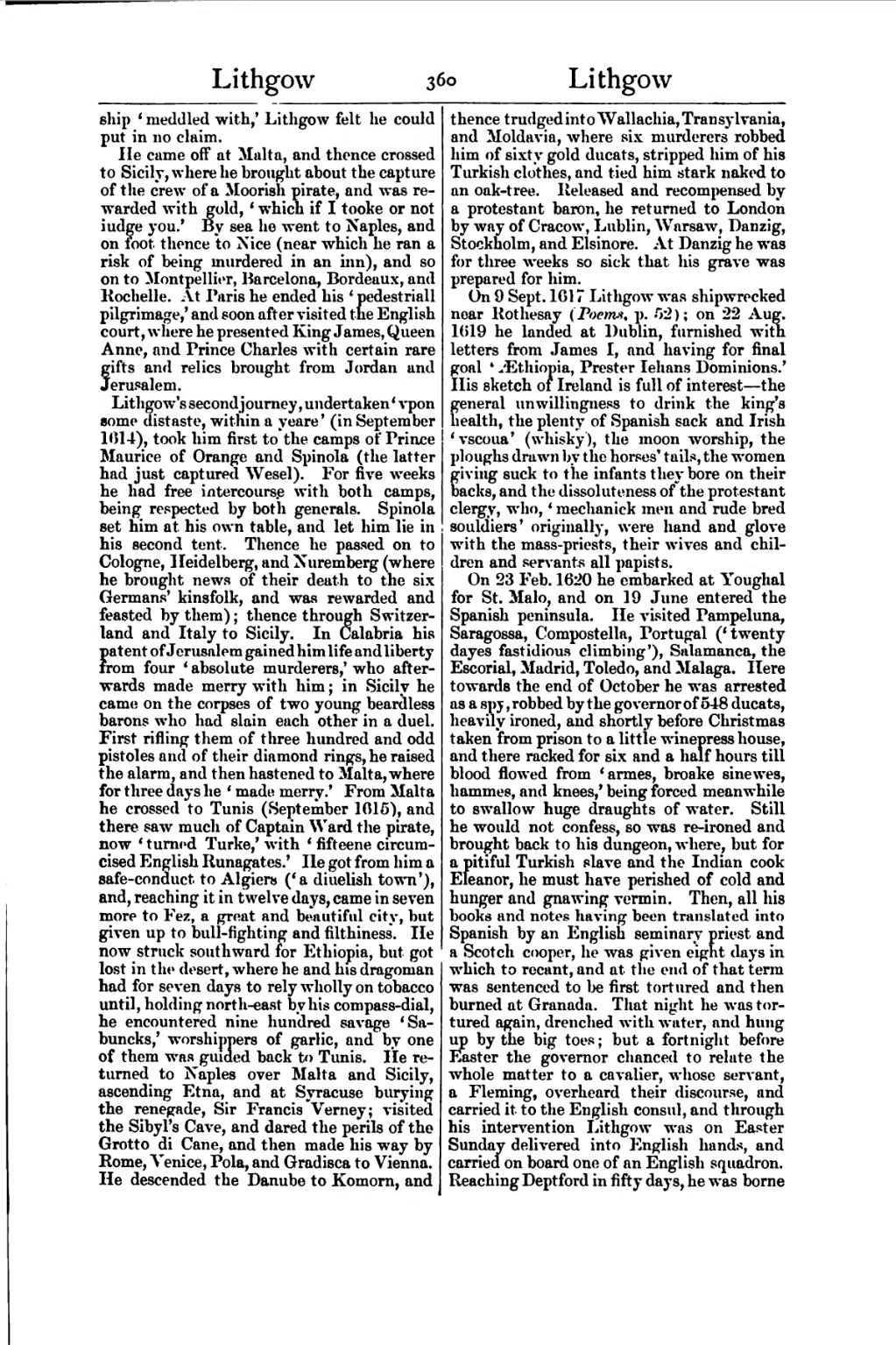ship ‘meddled with,’ Lithgow felt he could put in no claim.
He came off at Malta, and thence crossed to Sicily, where he brought about the capture of the crew of a Moorish pirate, and was rewarded with gold, ‘which if I tooke or not iudge you.’ By sea he went to Naples, and on foot thence to Nice (near which he ran a risk of being murdered in an inn), and so on to Montpellier, Barcelona, Bordeaux, and Rochelle. At Paris he ended his ‘pedestriall pilgrimage,’ and soon after visited the English court, where he presented King James, Queen Anne, and Prince Charles with certain rare gifts and relics brought from Jordan and Jerusalem.
Lithgow's second journey, undertaken ‘vpon some distaste, within a yeare’ (in September 1614), took him first to the camps of Prince Maurice of Orange and Spinola (the latter had just captured Wesel). For five weeks he had free intercourse with both camps, being respected by both generals. Spinola set him at his own table, and let him lie in his second tent. Thence he passed on to Cologne, Heidelberg, and Nuremberg (where he brought news of their death to the six Germans' kinsfolk, and was rewarded and feasted by them); thence through Switzerland and Italy to Sicily. In Calabria his patent of Jerusalem gained him life and liberty from four ‘absolute murderers,’ who afterwards made merry with him; in Sicily he came on the corpses of two young beardless barons who had slain each other in a duel. First rifling them of three hundred and odd pistoles and of their diamond rings, he raised the alarm, and then hastened to Malta, where for three days he ‘made merry.’ From Malta he crossed to Tunis (September 1615), and there saw much of Captain Ward the pirate, now ‘turned Turke,’ with ‘fifteene circumcised English Runagates.’ He got from him a safe-conduct to Algiers (‘a diuelish town’), and, reaching it in twelve days, came in seven more to Fez, a great and beautiful city, but given up to bull-fighting and filthiness. He now struck southward for Ethiopia, but got lost in the desert, where he and his dragoman had for seven days to rely wholly on tobacco until, holding north-east by his compass-dial, he encountered nine hundred savage ‘Sabuncks,’ worshippers of garlic, and by one of them was guided back to Tunis. He returned to Naples over Malta and Sicily, ascending Etna, and at Syracuse burying the renegade, Sir Francis Verney; visited the Sibyl's Cave, and dared the perils of the Grotto di Cane, and then made his way by Rome, Venice, Pola, and Gradisca to Vienna. He descended the Danube to Komorn, and thence trudged into Wallachia, Transylvania, and Moldavia, where six murderers robbed him of sixty gold ducats, stripped him of his Turkish clothes, and tied him stark naked to an oak-tree. Released and recompensed by a protestant baron, he returned to London by way of Cracow, Lublin, Warsaw, Danzig, Stockholm, and Elsinore. At Danzig he was for three weeks so sick that his grave was prepared for him.
On 9 Sept. 1617 Lithgow was shipwrecked near Rothesay (Poems, p. 52); on 22 Aug. 1619 he landed at Dublin, furnished with letters from James I, and having for final goal ‘Æthiopia, Prester Iehans Dominions.’ His sketch of Ireland is full of interest—the general unwillingness to drink the king's health, the plenty of Spanish sack and Irish ‘vscoua’ (whisky), the moon worship, the ploughs drawn by the horses' tails, the women giving suck to the infants they bore on their backs, and the dissoluteness of the protestant clergy, who, ‘mechanick men and rude bred souldiers’ originally, were hand and glove with the mass-priests, their wives and children and servants all papists.
On 23 Feb. 1620 he embarked at Youghal for St. Malo, and on 19 June entered the Spanish peninsula. He visited Pampeluna, Saragossa, Compostella, Portugal (‘twenty dayes fastidious climbing’), Salamanca, the Escorial, Madrid, Toledo, and Malaga. Here towards the end of October he was arrested as a spy, robbed by the governor of 548 ducats, heavily ironed, and shortly before Christmas taken from prison to a little winepress house, and there racked for six and a half hours till blood flowed from ‘armes, broake sinewes, hammes, and knees,’ being forced meanwhile to swallow huge draughts of water. Still he would not confess, so was re-ironed and brought back to his dungeon, where, but for a pitiful Turkish slave and the Indian cook Eleanor, he must have perished of cold and hunger and gnawing vermin. Then, all his books and notes having been translated into Spanish by an English seminary priest and a Scotch cooper, he was given eight days in which to recant, and at the end of that term was sentenced to be first tortured and then burned at Granada. That night he was tortured again, drenched with water, and hung up by the big toes; but a fortnight before Easter the governor chanced to relate the whole matter to a cavalier, whose servant, a Fleming, overheard their discourse, and carried it to the English consul, and through his intervention Lithgow was on Easter Sunday delivered into English hands, and carried on board one of an English squadron. Reaching Deptford in fifty days, he was borne
